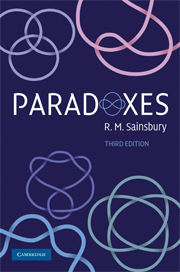Book contents
- Frontmatter
- Contents
- Foreword to third edition
- Introduction
- 1 Zeno's paradoxes: space, time, and motion
- 2 Moral paradoxes
- 3 Vagueness: the paradox of the heap
- 4 Acting rationally
- 5 Believing rationally
- 6 Classes and truth
- 7 Are any contradictions acceptable?
- Appendix I Some more paradoxes
- Appendix II Remarks on some text questions and appended paradoxes
- Bibliography
- Index
5 - Believing rationally
Published online by Cambridge University Press: 05 June 2012
- Frontmatter
- Contents
- Foreword to third edition
- Introduction
- 1 Zeno's paradoxes: space, time, and motion
- 2 Moral paradoxes
- 3 Vagueness: the paradox of the heap
- 4 Acting rationally
- 5 Believing rationally
- 6 Classes and truth
- 7 Are any contradictions acceptable?
- Appendix I Some more paradoxes
- Appendix II Remarks on some text questions and appended paradoxes
- Bibliography
- Index
Summary
This chapter concerns problems about knowledge or rational belief. The first main section, called “Paradoxes of confirmation,” is about two paradoxes that might be called “philosophers' paradoxes.” Let me explain.
Most of the paradoxes in this book are quite straightforward to state. Seeing what is paradoxical about them does not require any special knowledge – you do not have to be a games theorist or a statistician to see what is paradoxical about Newcomb's paradox or the Prisoner's Dilemma, nor do you have to be a physicist or sportsman to see what is paradoxical about Zeno's paradoxes. By contrast, the paradoxes of confirmation arise, and can only be understood, in the context of a specifically philosophical project. Therefore these paradoxes need some background (section 5.1.1) before being introduced (in sections 5.1.2 and 5.1.3). The background section sets out the nature of the project within which the paradoxes arise.
The last three main sections of the chapter (5.2–5.4) concern the paradox of the Unexpected Examination. Although it is hard to resolve, one form of it is easy enough to state. (More complex forms, discussed in sections 5.3–5.4, involve technicalities: these sections can be omitted without loss of continuity.) This paradox has been used to cast doubt on intuitively natural principles about rational belief and knowledge.
Paradoxes of confirmation
Background
We all believe that there is a firm distinction between strong, good, or reliable evidence on the one hand, and weak, bad, or unreliable evidence on the other.
- Type
- Chapter
- Information
- Paradoxes , pp. 90 - 122Publisher: Cambridge University PressPrint publication year: 2009



